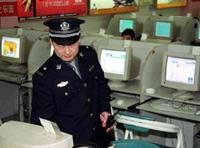[ Editor’s note: This new measure is different from the already existing surveillance conducted by the Internet police ]
CHINA - On May 24, the Beijing Association of Online Media recruited 200 special Internet supervisors from across China to conduct comprehensive surveillance on the flow of information.
According to the Web site Qianlong.net, 200 people joined the first batch of special Internet supervisors for Beijing. From now on, all Web sites in Beijing will be under the surveillance of these Internet supervisors. If there is any so-called illegal content and undesirable information, the supervisor will rapidly transmit the relevant information to the Beijing Association of Online Media.
Current affairs analyst Zeng Ning from Guiyang City believes that employing Internet supervisors may be illegitimate. He said, “Such surveillance action, in my opinion, may infringe upon the legal rights of the person who posts the information. For example, the person’s right to privacy or freedom of speech may be violated.”
The Beijing Association of Online Media Web site indicates that the part-time responsibilities of the 200 Internet supervisors include conducting surveillance on uncivilized behavior, illegal and undesirable information in Beijing Web sites, and promptly informing the Beijing Association of Online Media through telephone, email and non-periodic participation in meetings.
Internet supervisors are to be given a monthly subsidy of 100 yuan (approximately US$12) for accessing the Internet. Hu Ping, chief editor of Beijing Spring, indicates that the act of recruiting special supervisors reminds one of the “dictatorship of the proletariat” during the Cultural Revolution.
Hu said, “It involves mobilizing the populace to conduct mutual supervision, thereby creating anxiety in interpersonal relationships and inducing a decline in morality. More importantly, despotism is maintained and opinion is suppressed.”
Zeng Ning thinks that these Internet supervisors are in fact no different from informants. He said, “As an Internet supervisor, who are you to have the ability to pass judgment on what’s right and wrong in people’s speech? What is the standard used to form judgments? Above all, the act of informing against someone else is ignominious.” Hu indicates that tightening control of the Internet reveals the communist regime’s lack of confidence. He said, “In contrast to other forms of media, the Internet is more open. The Internet poses a major challenge to autocratic regimes. The communist regime does not hesitate to spend a lot of money and effort to control the Internet. The Golden Shield project is one example.”
“In addition, it continues to use the dictatorship of the proletariat method to achieve control. On the other hand, this illustrates our need for freedom of speech, freedom of press, and the vital significance of rejecting despotism.” Zeng hopes that human rights activists will challenge the hiring of Internet supervisors on legal grounds and prevent such a practice from being further implemented nationwide.



